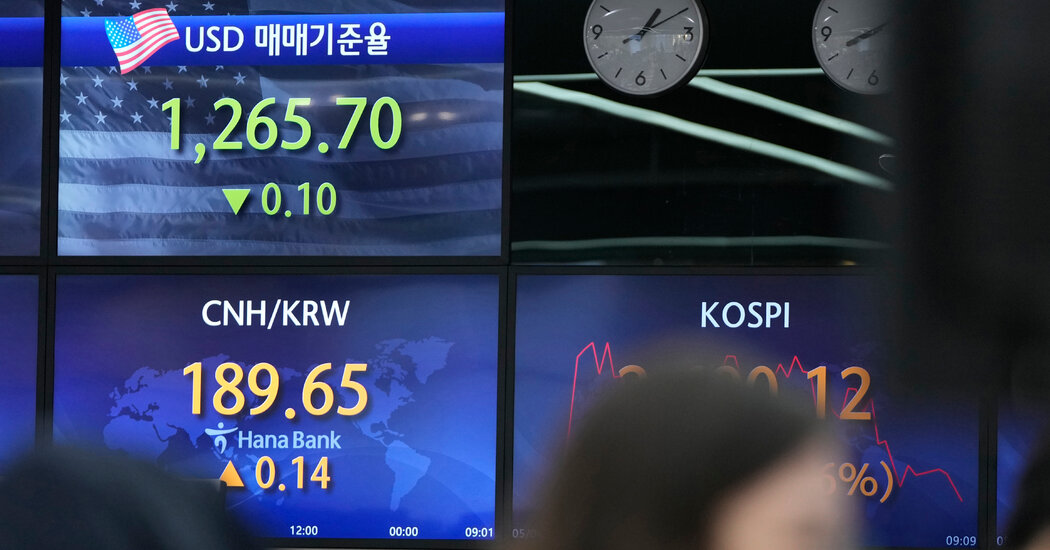
These are rocky times for most investments. But it has been a wonderful stretch for the dollar.
You may not have noticed if you haven’t traveled abroad and exchanged dollars for euros, yen or nearly any other major currency. But many currency traders, S&P 500 company executives and economists certainly have.
The U.S. Dollar Index, which tracks the dollar against six other important currencies, is hovering at levels it hadn’t reached in 20 years. Since the start of the year, it has gained 8 percent; in the last 12 months, it has risen 14 percent. Against the Japanese yen, the dollar has risen more than 13 percent this year alone.
The Federal Reserve’s latest moves to tighten monetary conditions are likely to spur the dollar further. Fed policymakers decided on Wednesday to raise short-term interest rates half a percentage point and to begin reducing the bonds on its $9 trillion balance sheet in June.
Continuing interest rate increases are likely in the Fed’s efforts to bring down inflation. While rising rates can be expected to make stocks, bonds and mortgage rates more volatile, there’s an excellent chance they will burnish the dollar.
Fundamentally, a flood of foreign money into U.S. businesses and investments has been driving up the value of the dollar.
In fact, a variety of actions that have unsettled the stock and bond markets have worked together to boost the greenback’s value against other currencies. These include the Fed rate increases, Russia’s war in Ukraine, global sanctions on Russia, soaring commodity prices, China’s lockdowns, and Europe’s and Japan’s economic slowdowns.
Against this backdrop of faltering world economies and geopolitical instability, global demand has risen for relatively safe and increasingly higher-yielding assets like Treasurys. The U.S. economy may be in a precarious spot, but compared with other countries, it has recovered well from the pandemic recession, its markets continue to be deep and relatively stable, and the interest rates offered on its government bonds are generous.
The Fed’s commitment to fight inflation by raising interest rates can be expected to push up Treasury yields further. That could make them even more attractive in comparison with the lower-yielding bonds of nations like Germany, Japan and China, which have been easing local monetary conditions, not tightening them. Already, yield discrepancies, or spreads, are wide. These are the yields for 10-year government bonds.
-
United States, about 3.1 percent.
-
Germany, about 1.1 percent.
-
Japan, less than 0.25 percent.
Even yields on Chinese bonds, which had been higher than those in the United States, dropped below Treasurys recently.
“The last two years of synchronized global easing have given way to rapid central bank policy divergence, fostering currency market volatility” and driving up the dollar, Morgan Stanley Wealth Management said in a note to clients on Monday.
Understand Inflation in the U.S.
The economic impact
The rising dollar has had significant effects on the global economy. For one thing, it has contributed to the surging U.S. trade deficit, which hit a new high in March. A more valuable currency makes imports cheaper and exports more expensive and less competitive on world markets.
For another, it reduces inflationary pressures in the United States.
“America is a nation of consumers, and over half of what Americans consume every year is made abroad,” said David Rosenberg, chief economist of his own firm, Rosenberg Research in Toronto, in an interview. “As the dollar goes up, the cost of these imported goods goes down. Those declining costs will be showing up in the Consumer Price Index. We haven’t seen the full brunt of it yet.”
Lisa Shalett, the chief investment officer of Morgan Stanley Wealth Management, said the rising dollar had mitigated some of the inflationary effects in the United States of rising commodities like oil, which are priced in dollars.
“It’s unusual for the dollar to strengthen at the same time as commodity prices are rising” largely because of Russia’s war in Ukraine, she said.
But if the Fed was to decide that the economy was too weak to withstand rising interest rates and “take the foot off the brakes and not tighten monetary policy as fast as everybody thinks,” she said, “then the dollar would weaken and we would still have high inflation in commodities, and we could get stuck in a real stagflation thing.” That, she added, “is why this is a particularly dangerous time for the economy.”
Mr. Rosenberg said that by raising interest rates sharply when the dollar was already helping to pull down inflation, the Fed might be driving the economy into a recession. Jerome H. Powell, the Fed chair, said at a news conference on Wednesday that inflation was too high for the Fed to hold back.
“I think we have a good chance to restore price stability without a recession,” Mr. Powell said.
Headwinds for companies
The rising dollar is making life difficult for many global corporations. On top of supply chain disruptions and inflation, they need to worry about the effect of the rising dollar on their profits. It’s earnings season on Wall Street, and this theme has come up repeatedly.
The dollar is hurting Apple’s revenue this quarter, Luca Maestri, the company’s chief financial officer, told analysts. “With respect to foreign exchange,” he said, “we expect it to be a nearly 300-basis-point headwind to our year-over-year growth rate.” That means a negative 3 percent effect.
In much the same vein, Andre Schulten, chief financial officer for Procter & Gamble, said: “We’ve seen another step in cost pressures, and foreign exchange rates have moved further against us.” Losses from the dollar are likely “to be a $300 million after-tax headwind to earnings for the fiscal year,” he said.
Inflation F.A.Q.
What is inflation? Inflation is a loss of purchasing power over time, meaning your dollar will not go as far tomorrow as it did today. It is typically expressed as the annual change in prices for everyday goods and services such as food, furniture, apparel, transportation and toys.
Stock market effects
These foreign exchange losses carry over to the stock market.
A 2018 study by S&P Dow Jones Indices found that S&P 500 companies with the least dependence on foreign revenue tended to perform well when the dollar was strengthening. That appears to be happening now.
A subindex of the S&P 500 — the S&P 500 U.S. Revenue Exposure Index, filled with domestic-oriented companies like Berkshire Hathaway, UnitedHealth Group, Home Depot and JPMorgan Chase — dropped 6.2 percent this year through Thursday. That’s a stupendous return when you compare the index with its more international counterpart, the S&P 500 Foreign Revenue Exposure Index, which lost 15.7 percent. The biggest constituents of the foreign index are Apple, Microsoft, Alphabet and Tesla.
While making substantial, direct bets on the dollar is hazardous, it is possible to do so through exchange-traded funds. The Invesco DB U.S. Dollar Index Bullish Fund, for example, has gained 8.1 percent this year. That compares with losses of 13 percent for the S&P 500 and 11.1 percent for the Bloomberg U.S. Aggregate Bond Index, a popular benchmark for bonds.
But before drawing practical conclusions from this comparison, remember that the dollar won’t keep rising forever. In fact, it may make more sense to bet on the opposite direction, Ms. Shalett suggested.
Putting money into companies with international exposure, and investing in markets that have been pummeled, like Japan, may be a good contrarian move if you have a lot of patience and fortitude, she said. Similarly, stocks and bonds in many emerging markets, which have been hit hard by the pandemic and by the war in Ukraine, are becoming attractively priced.
Chinese stocks and bonds may be good opportunities, too. “I suspect that when China emerges from these Covid lockdowns, and its economy really begins to revive, it will pull other emerging market economies with it,” Ms. Shalett said. “That might be when the dollar weakens.”
Or it might not. U.S. Treasury secretaries usually say they favor a strong dollar, even when economic conditions don’t warrant it, as I observed in 2015, during another bout of dollar ascendancy.
Like this one, it occurred largely because monetary policies in the United States were out of sync with those in other major countries. As a side effect, American travelers got a little more for their money, but American exporters suffered.
The dollar’s victory lap didn’t last long. This one probably won’t, either.




